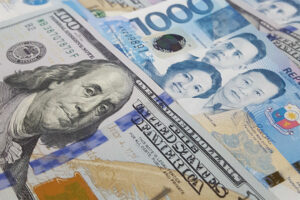THE PESO may stay at the P56-per-dollar level this week after strong US jobs data tempered market expectations of large rate cuts by the US Federal Reserve.
The local unit closed at P56.295 per dollar on Friday, strengthening by 7.5 centavos from its P56.37 finish on Thursday, Bankers Association of the Philippines data showed.
However, week on week, the peso declined by 21.8 centavos from its P56.077 finish on Sept. 27
The peso recovered against the dollar on Friday after September inflation slowed to an over four-year low, Rizal Commercial Banking Corp. Chief Economist Michael L. Ricafort said in a Viber message.
“The dollar-peso closed lower following the release of lower local inflation data,” a trader likewise said by phone.
Headline inflation slowed to an over four-year low of 1.9% in September from 3.3% in August and 6.1% a year ago, the Philippine Statistics Authority reported on Friday.
This was below the BSP’s 2%-2.8% forecast for the month and the 2.5% median estimate yielded in a BusinessWorld poll of 15 analysts.
The September consumer price index was also the slowest in 52 months or since the 1.6% print in May 2020.
In the first nine months, headline inflation averaged 3.4%, matching the central bank’s full-year forecast and well within its 2-4% annual target.
For this week, the trader said the peso could remain at the P56 level against the dollar following strong September US employment data.
The trader sees the peso moving between P56 and P56.40 per dollar this week.
Meanwhile, Mr. Ricafort expects the local unit to range from P56.20 to P56.40 on Monday.
The dollar jumped to a seven-week high on Friday and was on track to post its best week since September 2022 after a surprisingly strong jobs report for September led traders to cut bets that the Federal Reserve will make further 50-basis-point (bp) rate cuts, Reuters reported.
US nonfarm payrolls increased by 254,000 jobs last month, beating the 140,000 new jobs that economists polled by Reuters had anticipated.
The unemployment rate also unexpectedly slipped, to 4.1% from 4.2% in August.
Improving economic data and more hawkish comments from Fed Chair Jerome H. Powell last week, when he pushed back against expectations of continuing hefty rate cuts, led traders to reduce bets on a 50-bp reduction at the Fed’s next meeting on Nov. 6-7.
Those odds were completely wiped out after Friday’s data. Traders are now pricing in no chance of a 50-bp rate cut, down from around 31% earlier on Friday and 53% a week ago, the CME Group’s FedWatch Tool shows. A 25-bp reduction is seen as almost certain, with traders also seeing a small chance that the Fed will leave rates unchanged.
Bank of America expects the Fed to cut rates by 25 bps per meeting through March 2025, followed by reductions of 25 bps each quarter until the end of 2025, BofA US economist Aditya Bhave said in a report on Friday.
Chicago Fed President Austan Goolsbee called the data “superb” and said more labor market data along those lines would boost his confidence the economy is at full employment with low inflation.
The dollar index reached 102.69, the highest level since Aug. 16, and was on track for its best weekly percentage gain since September 2022.
The dollar has also been boosted by safe-haven demand on concerns about widening conflict in the Middle East. — Aaron Michael C. Sy with Reuters


















